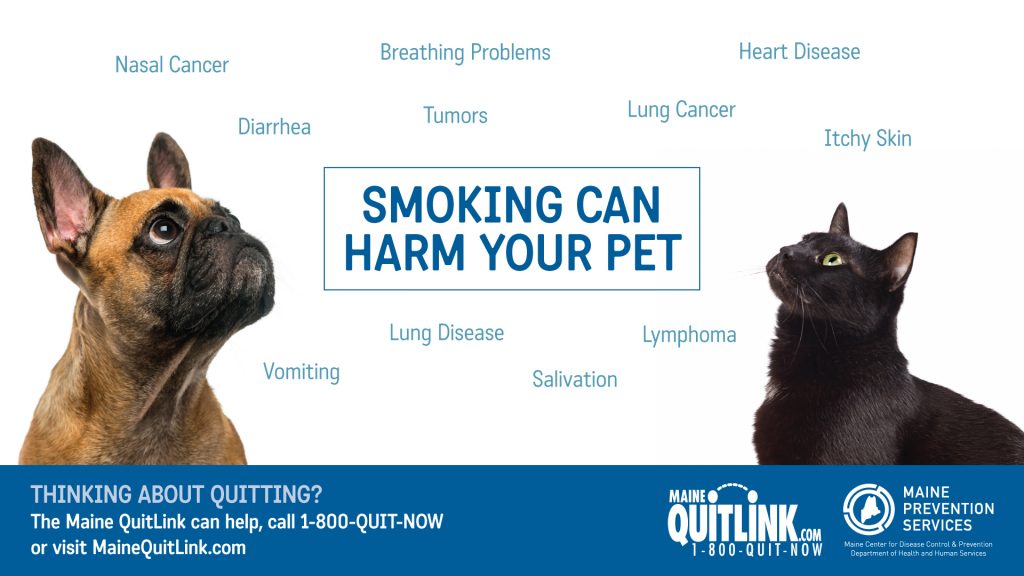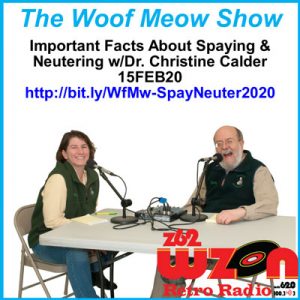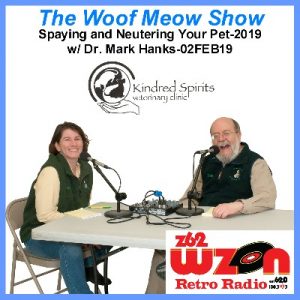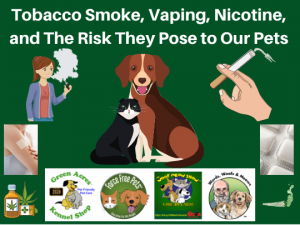 < A version of this article was published in the April 2021 issue of Downeast Dog News>
< A version of this article was published in the April 2021 issue of Downeast Dog News>
< Updated 24JUN21 >
< A short link for this page – http://bit.ly/Pets-Nicotine-APR21 >
Two nights before I started writing my April 2021 Words, Woofs, & Meows column for Downeast Dog News, my staff and I at Green Acres attended a training session called Tobacco Smoke and Animals-Understanding the Risks & Tips on How to Talk to Pet Owners About their Tobacco Use. This presentation was developed by the Maine CDC and presented for us by Public Health Educator/Tobacco specialists from Bangor Public Health. I knew I had to share what we learned in my next column, as this was important information.
You can listen to a podcast on this topic at this link.
One of the most important things you can do for your pet’s health is to make your home free of tobacco smoke, vapors, and nicotine. Tobacco, vaping, and nicotine products all pose a health risk to pets in your home.
Exposure to Smoke
When a tobacco product burns, it gives off smoke. Some of that smoke is inhaled and captured in the smoker’s lungs. The smoke exhaled by the smoker or that enters the air as the tobacco burns goes directly into the environment, becoming a threat to any living creature in that environment. That is called secondhand smoke, and it contains thousands of chemicals, 69 of which are known to cause cancer. Secondhand smoke occurs in any environment where smokers smoke.
A person’s exposure to secondhand smoke increases their risk of developing lung cancer or heart disease by as much as 30%. In addition, children are at a higher risk for these health issues; Sudden Infant Death Syndrome, acute respiratory infections, ear problems, learning disabilities, behavioral problems, and severe asthma.
A dog that lives with a smoker will have significantly higher cotinine levels in its blood due to exposure to nicotine from secondhand smoke.1 Other studies have indicated that exposure to tobacco smoke increased cancer risk in the nasal cavities and sinuses of long-snouted dogs2. Cancer risk for those dogs increased the more the smoker smoked. Dogs with short and medium-length noses were twice as likely to develop lung cancer if they lived with a smoker.3 Cats sharing a home with a smoker are twice as likely to develop lymphoma, a type of cancer. After five or more years of exposure, that increases to 3 times more likely.4
If you’ve spent any time in the same environment with a smoker, you know that smoke lingers. It forms a residue on walls, floors, carpets, furniture, clothes, hair, skin, and other surfaces. It accumulates on toys that your child or pet may put in their mouth. It will even cling to the coat of your pet. Blech!
This residue is classified as thirdhand smoke and contains toxins that your children can ingest when playing with their toys. In addition, pets may ingest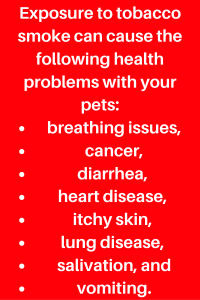 thirdhand smoke from their toys or when licking their paws or their coat. Cats are especially susceptible due to their self-grooming. As they lick at their fur, they expose the toxins from the smoke to the mucous membranes in their mouth.
thirdhand smoke from their toys or when licking their paws or their coat. Cats are especially susceptible due to their self-grooming. As they lick at their fur, they expose the toxins from the smoke to the mucous membranes in their mouth.
Exposure to tobacco smoke can cause the following health problems with your pets; breathing issues, cancer, diarrhea, heart disease, itchy skin, lung disease, salivation, and vomiting.
The only way to eliminate second and thirdhand smoke is to stop all smoking in your environment. However, even if you force everyone to smoke outside your home, the environmental tobacco levels in your home will still be five to seven times higher than in a house where everyone is a nonsmoker5.
If you have committed to having a smoke-free home or are ready to do so, I encourage you to take the Smoke-Free Homes Pledge at https://breatheeasymaine.org/smoke-free-homes-pledge/
Vaping and Exposure to E-Cigarette Vapors
E-Cigarettes, vape pens, and the various names used to describe them are “electronic nicotine delivery systems (ENDS).” These devices may look like real cigarettes, pens, and even USB flash drives.
An ENDS device uses an internal battery to heat a liquid, often called E-Juice or vape juice, to produce an aerosol inhaled by the user. This aerosol is also dispersed into the air others breathe when the user exhales and as a by-product of the ENDS device. This secondhand vape juice contains nicotine, ultrafine particles, volatile organic compounds, and artificial flavors. Some of these chemicals are known carcinogens. Additionally, this aerosol may contain hazardous heavy metals such as nickel, tin, and lead.
According to the CDC, many of these products, like JUUL, contain higher nicotine levels in a different chemical form than other products. They use nicotine salts instead of free-base nicotine. This allows the nicotine to be inhaled more easily, with less irritation to the lungs, encouraging increased use of an already addictive product. A single pod may contain as much nicotine as a pack of 20 regular cigarettes.
Just as the flavors added to vape pods make them more attractive to children, they may have the same effect on our pets. If a pet ingests a vape pod, nicotine toxicity can occur within 15 to 30 minutes of exposure. Depending on where you live, that may not give you enough time to get to a veterinarian. If you suspect ingestion, seek veterinary care immediately. Please do not wait until you observe signs of toxicity, as it may be too late.
Electronic Nicotine Delivery Systems are as unhealthy and can be as deadly as smoking tobacco. Thus, ENDS seems to be a fitting acronym for something with great potential to END life.
Nicotine
Nicotine is a natural component of the tobacco plant that acts as a stimulant and can reduce anxiety. However, it is incredibly addictive, and tiny amounts can be toxic. In addition, pets can ingest nicotine by consuming cigarettes and butts, 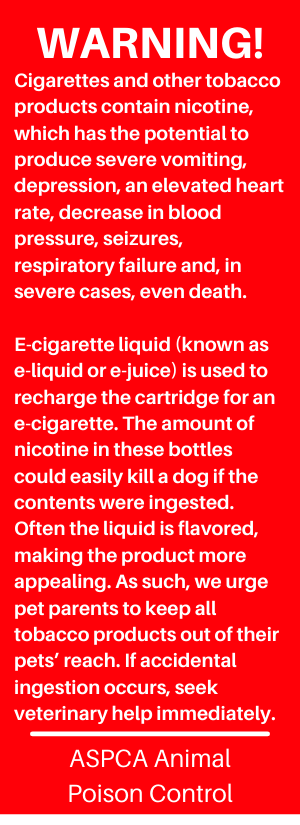 chewing tobacco, cigars, vaping pods and refills, and smoking cessation products such as patches, gums, etc.
chewing tobacco, cigars, vaping pods and refills, and smoking cessation products such as patches, gums, etc.
Signs of nicotine poisoning in pets include; drooling, nausea, vomiting, diarrhea, unsteady gait, dilated pupils, agitation, nervousness, weakness, an abnormal heart rate, high blood pressure, panting, tremors, seizures, paralysis, respiratory arrest, and even death. There is no antidote for nicotine poisoning, so immediate veterinary care is mandatory. Pets can and have died from nicotine poisoning.
How your dog will be affected by nicotine ingestion depends on what they have ingested and their size. Smaller dogs will be more susceptible. Items with the highest nicotine concentration are the most dangerous and include cigars, vaping pods, e-juice, and nicotine patches. These products should be secured where a child or pet can’t gain access to them.
The CDC states that 50 to 60mgs of nicotine is a deadly dose for an adult weighing 150 pounds. For pets, the toxic amount of nicotine is 0.5 to 1mg per pound of body weight. The lethal dose is 4mg per pound of body weight.
Nicotine Content of Typical Products and Amount Lethal to a Pet
| Nicotine Content in these items | Average Amount of Nicotine/mg/g) | Lethal Dose 10lb Pet, 40mg | Lethal Dose 20lb Pet, 80mg | Lethal Dose 60lb Pet, 240mg |
| Cigarette, one | 7 to 30 | 1.3 to 5.7 cigarettes | 2.67 to 11.43 cigarettes | 8 to 34.3 cigarettes |
| Cigar, one | 100 to 444 | 0.09 to 0.4 cigars | 0.18 to 0.8 cigars | 0.54 to 2.40 cigars |
| Chewing Tobacco | 7 to 16 | 2.5 to 5.7 g | 5 to 11.43 g | 15 to 34.3g |
| Vape Pod | 41.3 to 90 | 0.44 to 0.97 pods | 0.89 to 1.94 pods | 2.67 to 5.7 pods |
| Nicotine Patch | 7 to 114 | 0.35 to 5.7 patches | 0.7 to 11.43 patches | 2.1 to 34.3 patches |
| Nicotine Gum, 1 pc |
2 to 4 | 10 to 20 pcs | 20 to 40 pcs | 60 to 120 pcs |
Think Beyond Your Home
Remember, your pet can be exposed to tobacco, vaping, and smoking cessation products outside of your home. These products can be found in vehicles, the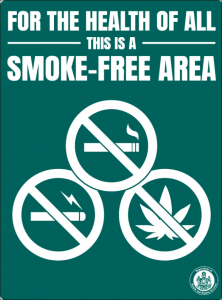 home of family and friends, and places your pet spends time, such as a boarding or daycare facility, the groomer, the dog trainer, or even your veterinarian’s offices. In addition, the use of tobacco and vaping products at events where pets may be present should also be a concern. Look for signs like this one at businesses where your pet spends time.
home of family and friends, and places your pet spends time, such as a boarding or daycare facility, the groomer, the dog trainer, or even your veterinarian’s offices. In addition, the use of tobacco and vaping products at events where pets may be present should also be a concern. Look for signs like this one at businesses where your pet spends time.
Be aware that waste material from tobacco and vaping products can be equally toxic and are not always disposed of properly. Look for them in parks, dog parks, hiking trails, and even public streets where you walk your dog.
So How Do I Quit or Help Someone Else Quit?
Nicotine is an addictive drug. Sadly, tobacco and vaping companies are taking advantage of that fact to fill their coffers as your health and those around you are put at risk. Data indicates that 70% of tobacco users want to quit, and more than half attempt to stop yearly. Keep trying!
Only you can decide if you’re going to stop smoking or vaping. If you choose to quit tobacco, vaping, or both, the state of Maine has resources ready to assist you. I encourage you to check them out at MaineQuitLink.com – https://mainequitlink.com/. When you quit, you know that the rest of your family, including your pets, will benefit.
When trying to help others to quit, make it about the smoke, not the smoker. Please share information about the danger of smoke with other members of your family without shaming them. Often, protecting the health of others can be a great motivator. If they’re not ready to quit, suggest they stop smoking indoors. Lastly, recognize that talking about the dangers of tobacco use is not a one-time event. Be prepared to bring it up again, but no shaming or nagging. You can find many informative fact sheets and infographics at the MaineHealth Center for Tobacco Independence website – https://ctimaine.org/
Resources
Cited References
1Bertone-Johnson ER, Procter-Gray E, Gollenberg AL, et al. Environmental tobacco smoke and canine urinary cotinine level. Environ Res. 2008;106(3):361-4. Available at: http://www.ncbi.nlm.nih.gov/pubmed/17950271. Accessed Nov 11, 2012.
2Reif JS, Bruns C, Lower KS. Cancer of the Nasal Cavity and Paranasal Sinuses and Exposure to Environmental Tobacco Smoke in Pet Dogs. Am J Epidemiol 1998; 147:488–92. Available at: http://aje.oxfordjournals.org/content/147/5/488.short. Accessed Nov 11, 2012.
3Reif JS, Dunn K, Ogilvie GK et al. Passive smoking and canine lung cancer risk. Am J Epidemiol 1992 Feb 1;135(3):234-9. Available at: http://www.ncbi.nlm.nih.gov/pubmed/1546698. Accessed Nov 11, 2012.
4Environmental Tobacco Smoke and Risk of Malignant Lymphoma in Pet Cats; Am J Epidemiol 2002; 156:268–73. Bertone ER, Snyder LA, Moore AS. http://aje.oxfordjournals.org/content/156/3/268.full
5Matt GE, Quintana PJE, Hovell MF et al. Households contaminated by environmental tobacco smoke: sources of infant exposures. Tob Control 2004;13:29-3. Available at: http://tobaccocontrol.bmj.com/content/13/1/29.short. Accessed Nov 11, 2012.
Other Resources
Smoking, Vaping, Nicotine & Pets
- Stop Smoking – For Your Health and Your Pets’ Health – AVMA website – https://www.avma.org/public/PetCare/Pages/Stop-smoking-for-your-pets-health.aspx
- Animal Poison Control Center – https://www.aspca.org/pet-care/animal-poison-control
- US FDA – Be Smoke-free and Help Your Pets Live Longer, Healthier Lives – https://www.fda.gov/animal-veterinary/animal-health-literacy/be-smoke-free-and-help-your-pets-live-longer-healthier-lives
- E-CIGARETTES AND PETS DO NOT MIX – https://www.petpoisonhelpline.com/uncategorized/e-cigarettes-pets-mix/
- CDC – Quick Facts on the Risks of E-cigarettes for Kids, Teens, and Young Adults – https://www.cdc.gov/tobacco/basic_information/e-cigarettes/Quick-Facts-on-the-Risks-of-E-cigarettes-for-Kids-Teens-and-Young-Adults.html
Resources to Help You Quit Smoking or Vaping
- Bangor Public Health & Community Services – Tobacco, E-Cig, & Vaping Prevention – https://www.bangorpublichealth.org/community/tobacco-ecig-vaping-prevention/
- MaineQuitLink.com – https://mainequitlink.com/
- BreatheEasyMaine.org – https://breatheeasymaine.org/
- Smoke-Free Homes Pledge – https://breatheeasymaine.org/smoke-free-homes-pledge/
- MaineHealth Center for Tobacco Independence website – https://ctimaine.org/
________________________________________________________________________
Don Hanson is the co-owner of the Green Acres Kennel Shop ( greenacreskennel.com ) in Bangor, Maine, where he has been helping people with their pets since 1995. He is also the founder of ForceFreePets.com, an online educational resource for people with dogs and cats. Don is a Bach Foundation Registered Animal Practitioner (BFRAP), Certified Dog Behavior Consultant (CDBC), Associate Certified Cat Behavior Consultant (ACCBC), and a Certified Professional Dog Trainer (CPDT-KA). He is a member of the Pet Professional Guild (PPG). Don is committed to PPG’s Guiding Principles and the Pain-Free, Force-Free, and Fear-Free training, management, and care of all pets. He serves on the PPG Steering Committee and Advocacy Committee and is the Chair of The Shock-Free Coalition ( shockfree.org ). Don produces and co-hosts a weekly radio show and podcast, The Woof Meow Show, that airs on Z62 Retro Radio WZON (AM620) and WKIT 103.3-HD3 streamed at http://bit.ly/AM620-WZON every Saturday at 9 AM. Podcasts of the show are available at http://bit.ly/WfMwPodcasts/, the Apple Podcast app, and Don’s blog: www.words-woofs-meows.com. The opinions in this post are those of Don Hanson.
©10-Mar-21, Donald J. Hanson, All Rights Reserved
< Click for Copyright and Use Policy >
